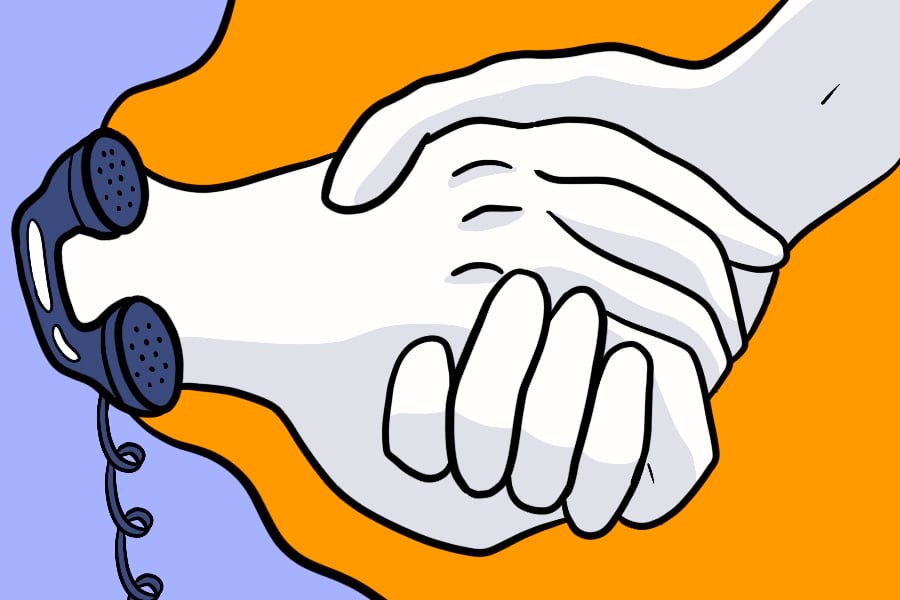After 988’s launch, advocates say local mental health response systems still have a ways to go
Daily file illustration by Olivia Abeyta
About ten years after Skokie’s Living Room opened, Evanston will soon have a free walk-in mental health crisis center of its own.
February 9, 2023
Before the 988 Suicide & Crisis Lifeline launched nationally last July, experts often dubbed it 911 for mental health crises: a short, easy-to-remember emergency number that any person could phone.
Seven months after 988 went live, advocates and mental health professionals say the crisis line is a significant step in expanding mental health services. However, they also say the crisis line still needs more local staffing and services to become a robust mental health care resource — including in Evanston and Cook County.
When someone calls 988, they can connect with a trained crisis counselor. But if a situation calls for an in-person response, the operator can refer the call to a local mobile crisis service. The 988 lifeline currently operates six call centers in Illinois, only one of them in Cook County.
In a July 2022 release, Illinois officials emphasized the significance of the launch as the COVID-19 pandemic has continually eroded people’s mental health. Suicide is the 11th leading cause of death in Illinois and the third among people ages 15 to 34, according to the release.
Though 988 is meant to mirror 911, the crisis line aims to avoid sending police responders to mental health crisis calls.
“988 will help people across the state prevent mental health crises from escalating into emergencies,” Illinois Department of Human Services Secretary Grace B. Hou said in July.
Trilogy Behavioral Healthcare, a Chicago-based mental health care organization, launched its own crisis line in January 2022. In addition to fielding calls, its First-response Alternative Crisis Team sends trained responders to people in crisis as an alternative to police. Chris Mayer, Trilogy’s clinical director, said FACT has recieved relatively few referral calls from 988 since last summer.
Mayer said the 988 line refers about five calls a month to Trilogy — compared to the about five referrals a week FACT receives from the Evanston Police Department. The hotline receives about 400 calls monthly, with most people directly calling Trilogy, according to Mayer.
“It seems like one challenge for (988) has been that the different mobile crisis teams are in different stages of being up and running in different places,” Mayer said. “So we get a lot of requests to go to further away places that aren’t in the area we cover.”
In the long term, the Substance Abuse and Mental Health Services Administration, which operates 988, aims to develop a mental health care system that provides every person “someone to talk to, someone to respond, and somewhere to go,” according to its website.
Mayer said while 988 acts as the primary response and resources like FACT as the secondary, localities like Evanston and Illinois still have to work on creating the “somewhere to go”: robust facilities for people seeking mental health care.
Jen McGowan-Tomke, chief operating officer at the National Alliance on Mental Illness Chicago, said SAMHSA plans to develop its own mobile response teams in the long term.
Before 988’s launch, 81% of Illinois calls to the National Suicide Prevention Lifeline were transferred to out-of-state call centers. In August 2022 — a month after its launch — the in-state answer rate jumped to 85%, according to state reports.
Still, McGowan-Tomke said 988 is not meant to be “the full system.” States and localities still need to make concerted investments to expand mobile crisis teams, mental health urgent care systems and long-term facilities, she added.
“I really do see this as a multi-year effort to build the mental health crisis system that we should have and that people deserve,” McGowan-Tomke said. “And there’s still a lot of work towards that vision.”
Email: [email protected]
Twitter: @maiapandey
Related Stories:
— First-response Alternative Crisis Team provides mental health support to people in crisis
— City Council hears updates on Trilogy’s crisis emergency response program and Living Room












